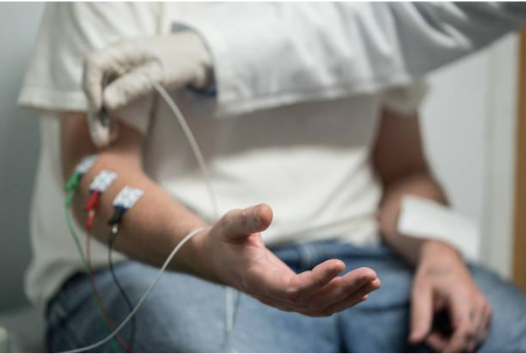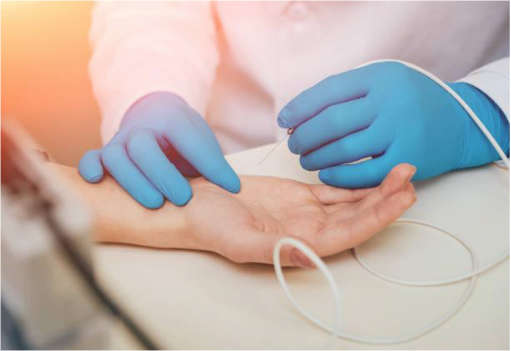Electromyoneurography (ENMG – EMG i NG)
In our clinic we perform an advanced diagnostic procedure known as electromyneurography or ENMG. This procedure combines electromyography (EMG) and neurography (NG) to assess in detail the function of the muscles and the conductivity of the nerves that control them.
What is electromyoneurography?
ENMG (Electromyography and Nerve Conduction Study) is a key diagnostic neuroimaging tool for the precise assessment of muscle and nerve health. It consists of two diagnostic procedures:
- Electromyography (EMG): this diagnostic procedure measures the electrical activity of your muscles during rest and contraction. A small needle electrode is inserted into your muscle, and the electrical signals are recorded. This helps to identify abnormalities in the function of the muscle, such as weakness or atrophy.
- Neurography (NG): this test measures the speed and intensity of the electrical signals that travel through your nerves. Electrodes are placed on the skin over the nerves and muscles. A small electrical current stimulates the nerve and stimulates a response in the muscle. This helps to identify nerve damage or dysfunction.
This relatively painless procedurecan provide valuable information for diagnosis and treatment planning...
- Provides an objective assessment of nerve and mouse function
- Helps distinguish nerve problems from muscle problems
- May be useful for the development of the neuromuscular junction
- It can help you decide the best treatment plan
When is the ENMG diagnostic procedure recommended?
ENMG is usually recommended when you have symptoms suggestive of possible nerve or muscle damage:
- Weakness of the mouse:this is the most common symptom that can lead to an ENMG test. Weakness can be localised to a specific muscle or group of muscles, or it can be generalised and affect the whole body.
- Tearing: Unpleasant sensations of stiffness, pecking or "pins and needles" in the hands and feet may indicate a nerve sprain.
- Pain: ENMG can be used to differentiate pain caused by nerve damage from pain of other origins.
- Loss of sensation: nerve damage can cause loss of sensation in certain parts of the body.
- Coordination problems: problems with coordination and balance can be a sign of nerve or muscle damage.
- Muscle cramps or twitching: Involuntary muscle cramps or twitching may be related to nerve or muscle problems.
- Exposure to risk factors for nerve damage, such as diabetes, autoimmune pain and professional disorders.
- A study on the effects of neuromuscular junctions.
How does ENMG contribute to diagnostics?
ENMG can be a tool in the diagnosis and treatment of various neuromuscular disorders:
Diagnosing neuromuscular disorders
ENMG helps us to diagnose a wide range of pain affecting nerves and muscles, including:
- Carpal tunnel syndrome: Carpal tunnel syndrome can pinch the nerve in the arm, causing stiffness, pain and weakness.
- Peripheral neuropathy: Pinching of the nerves in the hands and feet can manifest itself as weakness, numbness, pain and discomfort.
- Myasthenia gravis: Autoimmune pain that causes weakness of the muscles, especially in the cheek, eyes and throat.
- Amyotrophic lateral sclerosis (ALS): Neurodegenerative pain that attacks the nerves responsible for muscle control.
- Muscular pain: ENMG can distinguish problems with nerves from primary muscular pain.
Identification of the type of counting
ENMG can help to determine the location and type of nerve or muscle injury. For example, it can distinguish whether weakness of the muscle is due to a problem with the muscle itself or with the nerve that controls it.
Washing the progression of pain
ENMG se može koristiti periodički za praćenje napredovanja neuromuskularnih poremećaja i procijenjivanje učinkovitosti liječenja.
Planiranje liječenja
ENMG can be used periodically to reduce the progression of neuromuscular pain and to improve the effectiveness of treatment.
Positive suspicion of muscle weakness
If you have symptoms of muscle weakness, stiffness, pain or problems with coordination, ENMG can help identify the cause.
How do I get to the check-up? How does the check-up work? What can you expect during and after the examination?
How do I get to the check-up? We pray that you will come to the ENMG for an examination:
- Tell us about your injections and implants: If you are using injections or have implants, especially those that can affect the nervous system, it is important to tell us how we will adapt the diagnostic procedure.
- You drink caffeine and alcohol: We recommend that you do not drink caffeine and alcohol to ensure the best possible results from the examination.
- Come to the examination by avoiding the use of creams or lotions on your skin.
How is the review being carried out?
- Preparation: You may need to purchase jewellery from the area where the test will be conducted. We will be able to seat you comfortably in the examination chair and explain the details of the procedure.
- Primed electrode: Clean the area to be tested with alcohol. Apply thin electrodes or surface electrodes to selected parts of the body to measure the electrical activity of the muscles and nerves. You may suffer short-term pain from the electrode or discomfort or pain during the test.
- Stimulation and sensing: It is possible to stimulate or activate muscles and nerves by sensing their electrical signals. You may be asked to move or stretch certain muscles. We may give false electrical impulses to nerves that could cause short-term twitching or discomfort.
- Result analysis: we will analyse the results in detail to provide you with a precise diagnosis and treatment plan.
- If needles have been used, they should be removed and the area covered with cotton wool or wrapping. If you have experienced discomfort or pain, this should be avoided for the time being.
- We will discuss the test results with you and clarify what they mean, or in some cases recommend additional diagnostic procedures.

After the examination
After the examination, recovery and rehabilitation after ENMG are usually short and uneventful. Most people can resume their normal activities from the end of the test. If you experience discomfort or pain, you can apply cold compresses for 15-20 minutes several times a day and avoid strenuous activities. If necessary, you can use a pain relief lotion after ibuprofen or similar. If you have any questions or concerns about the support, please contact us.
What are the results of the ENMG diagnostic test?
ENMG results can be conveniently compounded, or we can clarify them for you and give you more information about what they mean for you.
Here is a brief overview of what some of the usual results can mean:
- Normal results: Normal results indicate that your nerves and muscles are in good condition.
- Abnormal results: Abnormal results may indicate a nerve or muscle impairment, or both. The type of damage and its severity can be determined by specific test results.
Some of the usual abnormal findings and their possible signs are:
- Reduced EMG signal amplitude: This may indicate a muscle or nerve damage.
- Prolonged nerve conduction time: this may indicate demyelination of nerves, for example in multiple sclerosis.
- Reduced nerve sparing: This may indicate axonal nerve ossification, as in Guillain-Barré syndrome.
- Fibrillation potentials: These signals may indicate the presence of a lesion of the myocardium or nerve.
- Thalamic potentials: These signals may indicate nerve damage.
It is important to note that ENMG results are only one part of the diagnostic process. We also need to take into account your symptoms, medical history and other tests to make a final diagnosis.
The most important questions about the ENMG:
Q: Is the procedure painful?
A: It is possible to experience mild discomfort from the electrode placement, or most patients describe the procedure as untreatable. Nowadays we have modern devices that do not use needles.
Q: How long does the examination take?
A: It usually takes between 30 minutes and six hours, depending on the needs of your specific case.
Q: When can I expect results?
A: Results will be available from the end of the examination or within a few days, depending on the complexity of the analysis.
For further information or to request an ENMG review, please feel free to contact us.
If you have symptoms of muscle weakness, tremor or pain, or if your doctor has recommended an ENMG for a detailed diagnosis, please contact us today. We will answer your questions and queries regarding the symptoms or the ENMG examination.

